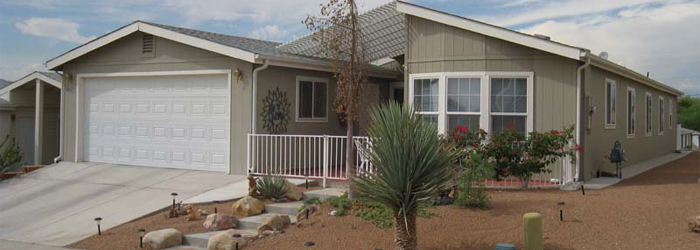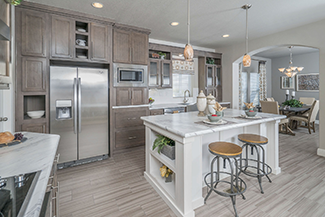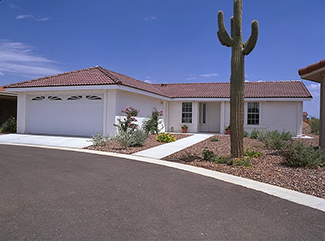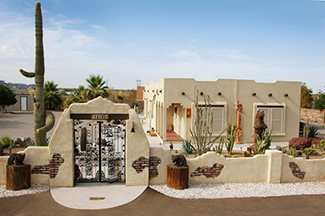The New Generation of Manufactured Housing
 14 July 2020
14 July 2020 

Customize your lifestyle with a Manufactured Home
When was the last time you stepped inside a manufactured home? If you haven't seen a manufactured home in the last decade you are in for a pleasant surprise! Gone are the days of your grandmother's single wide trailer with paneling.
 The newer models are modern with split floor plans, high ceilings, drywall and beautiful finishes. The great room includes a kitchen with an island and plenty of counter space and cabinet storage. There are spaces for your dining room table and family room as well!
The newer models are modern with split floor plans, high ceilings, drywall and beautiful finishes. The great room includes a kitchen with an island and plenty of counter space and cabinet storage. There are spaces for your dining room table and family room as well!
Referred to in the past as mobile homes, manufactured houses (MH) are not on a chassis like an RV. They are generally moved once from the manufacturer to the home site where they are set on a solid foundation. Modular homes are different from manufactured homes in that they are constructed off site, transported in sections and joined on the property.
We visited with Steve Ladwig, housing consultant at Home Direct in Chandler. He told us there is not just one type of buyer and there is no typical client that purchases a MH. Ladwig ensures that his customers understand all that is involved in purchasing a MH. Not only does a homeowner buy the home, he gets to decide where that home will live. Ladwig says about 80% of the people who buy homes from Homes Direct are moving them onto property as opposed to a park setting. Many people like the idea of having some land and not living within the confining guidelines of an HOA. Manufactured homes provide this opportunity.
Cost Factors When Installing a Manufactured Home on A Lot
There are many cost factors to installing a manufactured home on a lot (including but not limited to):
Zoning
First and foremost, if you are planning on buying property it must be zoned for a MH. Not all property is, so it is important to know for sure before you make a purchase. For instance, you can't buy a manufactured home and put it in a planned community alongside site-built homes. It can be hard to find land zoned for MH in an urban setting.
Mortgage
Manufactured homes are considered higher risk so, not all mortgage companies will finance one. Rosie Certified Galaxy Lending Group does offer financing. Owner Harold Perkins tells us that homeowners who are applying for financing on a MH can expect stricter guidelines for qualifying including higher credit score requirements. A slightly higher interest rate is likely as well. Conventional, HUD, VA and FHA loans are all available for MH.
 NOTE: Resale value on manufactured housing tends to be less than site-built homes.
NOTE: Resale value on manufactured housing tends to be less than site-built homes.
Insurance
Manufactured homes carry distinct risks that are different from a home that is built on site. Due to this difference in risks, insurers prefer to group mobile homes into a different category says Theresa Crest of Rosie Certified Phocus Insurance Services. This may involve a slightly higher insurance rate.
Utilities
Electricity, septic, gas and water all require connection fees. The cost of utilities will be much higher if you purchase raw land and they have to be brought to the property.
Permitting
Permits from the city or county can take as much as 10 weeks. With partial staffing during the quarantine, it could be even longer.
Grading and Site Work
Once a permit is pulled, it is time to bring all of the utilities and water to the site. Adding a septic tank and overall grading and site work may be required as well.
Design
Each home is a custom order. With a new unit the customer gets to pick all of the finishes. There are upgrades available on many finishes like paint, cabinets and flooring. Of course, this will increase the sq. ft. cost of the home.
Cost Comparison
Even with the cost of land and utilities a MH is generally much cheaper than a traditional site-built home; this is due to the sq. ft. cost of building the home. Manufactured housing averages $49 sq. ft. while an onsite build ranges from $110 to $150 sq. ft.
Advances in the Manufactured Home Industry:

According to the Manufactured Housing Industry of Arizona (MHIA) the industry is highly regulated. Buildings abide by stringent building codes, safety inspection standards and strict installation requirements.
Ken Anderson has been at the helm as president of MHIA for the last 11 years to facilitate the goal as stated in their mission statement: The Manufactured Housing Industry of Arizona is an organization dedicated to the promotion and protection of the factory-built housing industry in Arizona.
Companies that belong to the trade association may be found on their website. To join the MHIA they must sign off on a code of ethics. Anderson is extremely proud of the fact they have had zero complaints in the time he has been in his current position.
The MHIA mediates legislatively on behalf of the industry to keep housing affordable. In addition, the MIHA was instrumental in creating Senate bill 1423 that provides a level of protection to the homeowner that was not available in the past.
Complaints about quality of a home can be submitted to the Arizona Department of Housing within 1 year of the installation date.
Where to Shop for a Manufactured Home:
- MHIA approved | Visit the Manufactured Housing Industry of AZ website to see if the company you are considering is listed. Ask for referrals and investigate the experience others have had with the company.
- Shop local! | There are several manufacturers right here in Arizona.
- Look for honest pricing | A good dealer will have prices displayed in full view. Pricing for upgrades should be listed as well.
- Choose a company who will help you through the process | Is the salesman more interested in off-loading a closeout item or in helping you to understand all the expenses and decisions involved? A salesperson who will guide you through the project is worth their weight in gold.
Bringing it Home:
Servicing a manufactured home can be challenging. Many manufactured homes are in rural areas outside the service area of many contractors. Be sure to check with others in the area to find out who is available to hire for repairs.
Are you one of a number of homeowners who, after sheltering in place, have become obsessed with the changes or updates that need to be made at your house? Maybe buying a piece of property and gaining some autonomy is a good fit for you and your family. A custom manufactured house could be a catalyst for making this happen for your family.
Podcast
Manufactured homes are not just for parks anymore; they have vastly improved too! We discuss why you should consider them as an addition or a second home, the difference between manufactured and modular homes, and the President of Manufactured Housing Of Arizona, Ken Anderson, details why these homes are nowhere near what your Grandfather's home used to be.
###
Photo Credits:
RELATED CONTENT:
- Resource: Arizona Department of Housing | Manufactured Housing Division
- Resource: Westland Distributing | Manufactured Home Parts, Installs, and Repairs
- Resource: Mobile Home Outfitters | Parts & Supplies
- Respurce: Manufactured Housing Industry of AZ
- Blog: 10 Questions to Ask Before Buying a Little Cabin in the Big Woods
- Blog: Can You Afford To Make Room for Mom & Dad?
- DIY Q&A: What Can a Handyman Do For you?
- DIY Q&A: Tips for Purchasing Rural Arizona Real Estate
- Find trusted Arizona contractors and home improvement service providers
Print this page
recent post
- Duck, Duck, Duct! How Often Should Ductwork Be Cleaned?
- Vinyl vs. Fiberglass Windows: Which Is The Better Choice Of Replacement Window?
- We May Be The Grand Canyon State, But The Rocky Mountains Are Important For Arizona
- Welcome to Arizona! Things A Newbie to Arizona Should Know
- The Pros & Cons of Buying A Flipped House
- Getting In On The Ground Floor
- Why It’s More Critical Than Ever To Get Your AC Serviced Before Summer
- The Reality of Remodeling
- What To Look For When Comparing Your Roofing Quotes
- What To Expect When Buying New Windows & Doors
